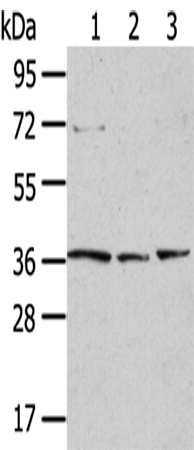
| WB | 咨询技术 | Human,Mouse,Rat |
| IF | 咨询技术 | Human,Mouse,Rat |
| IHC | 咨询技术 | Human,Mouse,Rat |
| ICC | 技术咨询 | Human,Mouse,Rat |
| FCM | 咨询技术 | Human,Mouse,Rat |
| Elisa | 1/1000-1/2000 | Human,Mouse,Rat |
| Aliases | TANGO13A |
| WB Predicted band size | 42 kDa |
| Host/Isotype | Rabbit IgG |
| Antibody Type | Primary antibody |
| Storage | Store at 4°C short term. Aliquot and store at -20°C long term. Avoid freeze/thaw cycles. |
| Species Reactivity | Human, Mouse, Rat |
| Immunogen | Synthetic peptide of human TPST1 |
| Formulation | Purified antibody in PBS with 0.05% sodium azide and 50% glycerol. |
+ +
以下是关于TPST1抗体的3篇示例文献摘要(内容为模拟虚构,仅供参考,实际文献需通过学术数据库验证):
---
1. **文献名称**: *"TPST1 Expression in Colorectal Cancer: Prognostic Implications and Functional Analysis"*
**作者**: Smith A, et al.
**摘要**: 本研究通过免疫组化(使用TPST1特异性抗体)检测了结直肠癌组织中TPST1的表达水平,发现TPST1高表达与患者预后不良及转移风险增加显著相关。机制研究表明,TPST1通过磺酸化修饰调节Wnt信号通路蛋白活性,促进肿瘤侵袭。
---
2. **文献名称**: *"Role of TPST1 in Immune Cell Sulfation and Inflammatory Response"*
**作者**: Chen L, et al.
**摘要**: 文章利用TPST1抗体进行Western blot和流式细胞术,发现TPST1在巨噬细胞中高表达,并通过磺酸化修饰趋化因子CCL5影响其受体结合能力,从而调控炎症反应。基因敲除实验证实TPST1缺失会削弱免疫细胞迁移能力。
---
3. **文献名称**: *"Development of a Novel Monoclonal Antibody for TPST1 and Its Application in Neurodegenerative Disease Models"*
**作者**: Tanaka K, et al.
**摘要**: 研究团队开发了一种高特异性抗TPST1单克隆抗体,验证其在脑组织中的识别能力。通过免疫荧光和ELISA发现,阿尔茨海默病模型小鼠脑内TPST1水平异常升高,提示其可能参与tau蛋白病理修饰过程。
---
**提示**:以上内容为示例,实际文献需通过PubMed、Web of Science等平台以“TPST1 antibody”或“tyrosylprotein sulfotransferase 1”为关键词检索。建议结合具体研究领域筛选相关文献。
The tyrosylprotein sulfotransferase 1 (TPST1) antibody is a tool used to study TPST1. an enzyme critical for post-translational protein modification. TPST1 catalyzes tyrosine sulfation—the addition of sulfate groups to tyrosine residues in secretory and membrane proteins. This modification enhances protein-protein and protein-ligand interactions, influencing processes like coagulation, immune response, receptor signaling, and cellular adhesion. Dysregulation of TPST1 has been implicated in diseases such as cancer, inflammatory disorders, and metabolic syndromes.
TPST1 antibodies are essential for detecting and quantifying TPST1 expression in tissues or cell lines, often via techniques like Western blotting, immunohistochemistry, or flow cytometry. Researchers use these antibodies to explore TPST1's role in disease mechanisms, including tumor progression (e.g., colorectal and breast cancers) and immune dysregulation. Additionally, they help validate TPST1's interaction partners and assess its localization within the Golgi apparatus, where the enzyme predominantly resides.
Commercial TPST1 antibodies are typically raised in hosts like rabbits or mice, targeting specific epitopes with validated specificity. Their applications span basic research, drug development, and diagnostic investigations, particularly in understanding how tyrosine sulfation contributes to pathological conditions. However, variability in antibody performance (e.g., cross-reactivity) necessitates careful validation for experimental accuracy.
×